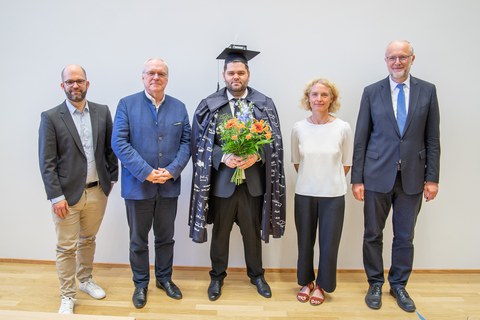Jun 23, 2025
Promotion Iurii Vakaliuk

Erfolgreiche Dissertationsverteidigung von Iurii Vakaliuk
On June 12, 2025, Iurii Vakaliuk successfully defended his dissertation 👨🎓 entitled "Development of the multi-objective framework MOET for design and analysis of resolved TRC structures". The event took place in the newly renovated Beyer Building at TU Dresden.
Abstract:
The dissertation presents the development of the Multi-Objective Evolutionary Tool (MOET), a novel numerical parametric framework designed to optimise textile-reinforced concrete (TRC) structures. Driven by the urgent need to address global climate change and significantly reduce greenhouse gas (GHG) emissions associated with construction, this research is motivated by the critical environmental impacts of conventional building practices. Recognising the substantial potential of innovative TRC structures to minimise material use while maximising structural performance, the study focuses specifically on filigree, shell-like TRC structures characterised by in-plane membrane actions, unveil the potential of utilisation of the extremely favourable span-to-material ratio that, in turn, means excellent structural performance. Furthermore, by leveraging the advantages of carbon fibre reinforcement, the research further explores opportunities to significantly reduce concrete cover and eliminate corrosion-related limitations common in steel-reinforced concrete, thus enhancing durability and extending service life.
The developed MOET framework integrates generative design principles and advanced numerical methods to explore and optimise complex structural forms based on predefined multi-objective criteria. Employing parametric modelling by means of data processing logic inspired by mechanisms and principles found in the organisation of the natural systems up to the molecular level, the framework ensures a high level of flexibility in exploring the design space. The MOET framework addresses the computational challenges of analysing complex geometries and material interactions by combining parametric design software with powerful finite element analysis tools and Python-based multiple failure assessment methods routines, thus enabling rapid iteration and evaluation of multiple design scenarios.
Additionally, the MOET framework is designed to facilitate future integration with machine learning models and artificial intelligence, enhancing its potential as a robust tool for sophisticated, data-driven decision-making in structural design and multi-objective optimisation fields. The research emphasises establishing a clear methodology for the collection and analysis of synthetic data, supporting the long-term vision of employing predictive surrogate models and optimisation algorithms for dynamic, real-time design adjustments.
The research concludes that the MOET framework effectively generates optimised TRC structures with superior load-bearing capacities and substantial material reductions, thereby demonstrating its potential to significantly contribute to sustainable construction practices.
The comprehensive approach of this research validates the structural capabilities and environmental benefits of TRC shell-like structures in the form of selected geometrical solutions. Experimental validation of numerical simulations confirms the reliability of the computational model and proposed failure assessment methods, highlighting significant weight savings, improved structural performance, and notable enhancements in overall resource efficiency compared to conventional concrete designs.
Future work considers the enhancement of the concreting methods, further detailed analysis of self-intersecting TRC shells, and continued refinement of the MOET environment to support broader applicability and integration with emerging construction technologies. Proposed areas of future exploration also encompass expanding the framework to address additional objectives such as cost-efficiency and lifecycle assessment metrics, aiming ultimately towards an environmentally responsive and resource-efficient construction industry.
Iurii Vakaliuk's scientific work, which he carried out primarily in project C01 of TRR 280, but also in the planning of the CUBE building in Dresden, was outstanding. The committee, consisting of Prof. Manfred Curbach, Prof. Josef Hegger and Dr.-Ing. Silke Scheerer, who wrote the expert reports, as well as Prof. Robert Jockwer and Prof. Ivo Herle, agreed on this, which is why Iurii Vakaliuk was awarded the title "summa cum laude". We congratulate him warmly!
Dear Iurii, we would like to take this opportunity to wish you every success in your academic career and all the best for the future! 👍🥳
